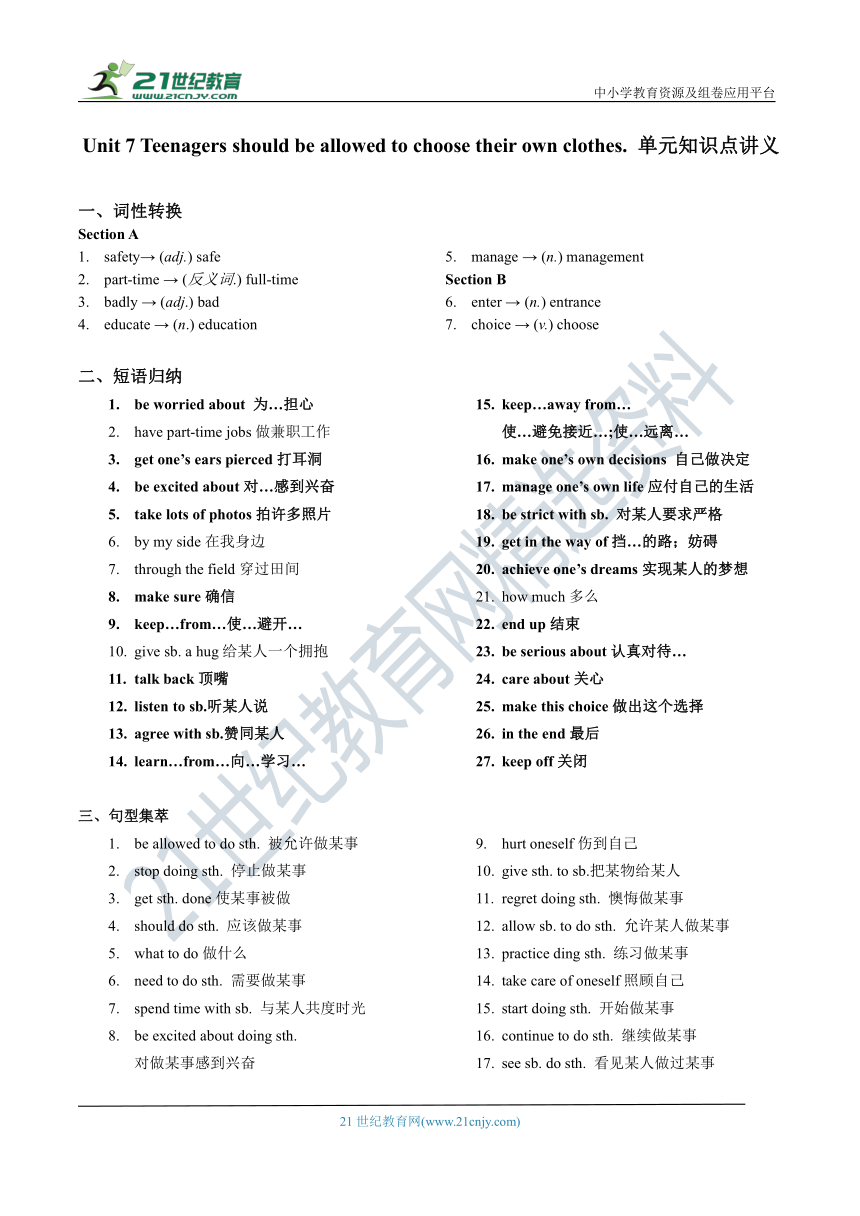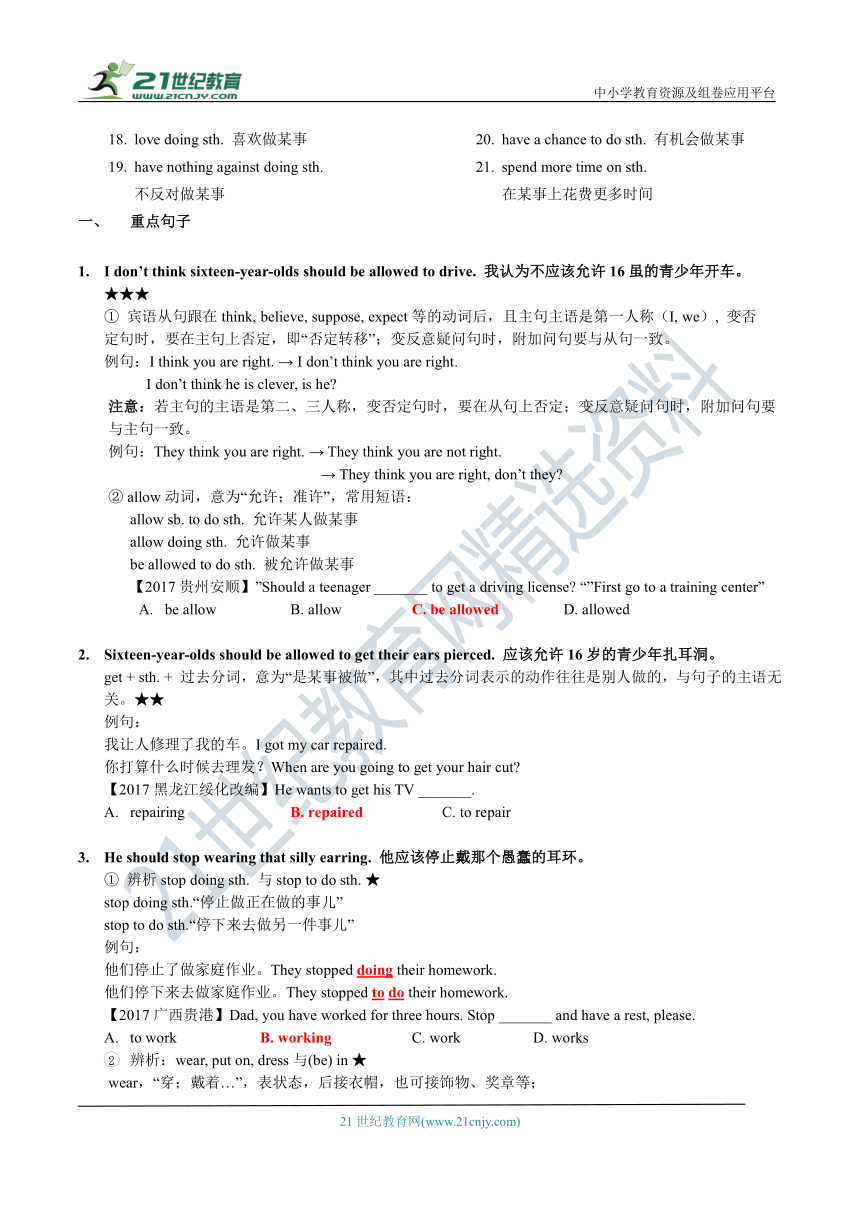Unit 7 Teenagers should be allowed to choose their own clothes. 单元知识点讲义
文档属性
| 名称 | Unit 7 Teenagers should be allowed to choose their own clothes. 单元知识点讲义 |  | |
| 格式 | zip | ||
| 文件大小 | 1.2MB | ||
| 资源类型 | 试卷 | ||
| 版本资源 | 人教新目标(Go for it)版 | ||
| 科目 | 英语 | ||
| 更新时间 | 2020-02-05 20:19:04 | ||
图片预览



文档简介
中小学教育资源及组卷应用平台
Unit 7 Teenagers should be allowed to choose their own clothes. 单元知识点讲义
一、词性转换
Section A
safety→ (adj.) safe
part-time → (反义词.) full-time
badly → (adj.) bad
educate → (n.) education
manage → (n.) management
Section B
enter → (n.) entrance
choice → (v.) choose
二、短语归纳
be worried about 为…担心
have part-time jobs做兼职工作
get one’s ears pierced打耳洞
be excited about对…感到兴奋
take lots of photos拍许多照片
by my side在我身边
through the field穿过田间
make sure确信
keep…from…使…避开…
give sb. a hug给某人一个拥抱
talk back顶嘴
listen to sb.听某人说
agree with sb.赞同某人
learn…from…向…学习…
keep…away from…
使…避免接近…;使…远离…
make one’s own decisions 自己做决定
manage one’s own life应付自己的生活
be strict with sb. 对某人要求严格
get in the way of挡…的路;妨碍
achieve one’s dreams实现某人的梦想
how much多么
end up结束
be serious about认真对待…
care about关心
make this choice做出这个选择
in the end最后
keep off关闭
三、句型集萃
be allowed to do sth. 被允许做某事
stop doing sth. 停止做某事
get sth. done使某事被做
should do sth. 应该做某事
what to do做什么
need to do sth. 需要做某事
spend time with sb. 与某人共度时光
be excited about doing sth.
对做某事感到兴奋
hurt oneself伤到自己
give sth. to sb.把某物给某人
regret doing sth. 懊悔做某事
allow sb. to do sth. 允许某人做某事
practice ding sth. 练习做某事
take care of oneself照顾自己
start doing sth. 开始做某事
continue to do sth. 继续做某事
see sb. do sth. 看见某人做过某事
love doing sth. 喜欢做某事
have nothing against doing sth.
不反对做某事
have a chance to do sth. 有机会做某事
spend more time on sth.
在某事上花费更多时间
重点句子
I don’t think sixteen-year-olds should be allowed to drive. 我认为不应该允许16虽的青少年开车。★★★
① 宾语从句跟在think, believe, suppose, expect等的动词后,且主句主语是第一人称(I, we), 变否
定句时,要在主句上否定,即“否定转移”;变反意疑问句时,附加问句要与从句一致。
例句:I think you are right. → I don’t think you are right.
I don’t think he is clever, is he?
注意:若主句的主语是第二、三人称,变否定句时,要在从句上否定;变反意疑问句时,附加问句要与主句一致。
例句:They think you are right. → They think you are not right.
→ They think you are right, don’t they?
② allow动词,意为“允许;准许”,常用短语:
allow sb. to do sth. 允许某人做某事
allow doing sth. 允许做某事
be allowed to do sth. 被允许做某事
【2017贵州安顺】”Should a teenager _______ to get a driving license? “”First go to a training center”
be allow B. allow C. be allowed D. allowed
Sixteen-year-olds should be allowed to get their ears pierced. 应该允许16岁的青少年扎耳洞。
get + sth. + 过去分词,意为“是某事被做”,其中过去分词表示的动作往往是别人做的,与句子的主语无关。★★
例句:
我让人修理了我的车。I got my car repaired.
你打算什么时候去理发?When are you going to get your hair cut?
【2017黑龙江绥化改编】He wants to get his TV _______.
repairing B. repaired C. to repair
He should stop wearing that silly earring. 他应该停止戴那个愚蠢的耳环。
① 辨析stop doing sth. 与stop to do sth. ★
stop doing sth.“停止做正在做的事儿”
stop to do sth.“停下来去做另一件事儿”
例句:
他们停止了做家庭作业。They stopped doing their homework.
他们停下来去做家庭作业。They stopped to do their homework.
【2017广西贵港】Dad, you have worked for three hours. Stop _______ and have a rest, please.
to work B. working C. work D. works
辨析:wear, put on, dress与(be) in ★
wear,“穿;戴着…”,表状态,后接衣帽,也可接饰物、奖章等;
put on,“穿;戴上…”,表动作,后接衣服、帽子等;
dress,“(给…)穿衣服”,表动作,宾语只能是人;
(be) in,“穿着”,表状态,后接表示衣服或颜色的名词。
例句:
今天孩子们都穿着漂亮的衣服。The children are wearing nice clothes today.
穿上暖和的衣服,否则你会感冒的。Put on warm clothes, or you’ll catch a cold.
他每天早晨自己穿衣服。He dresses himself every morning.
穿红衣服的那个女孩是他的女儿。The girl in red is his daughter.
【山东枣庄】Why are you _______ a T-shirt? You’ll probably catch a cold in this cold weather.
wearing B. recycling C. pulling D. selling
I’m going to bring my new camera to take lots of photos! 我打算带我的新相机去拍很多照片。★
辨析:bring, take与fetch
bring, “带来;拿来”(从别处带到说话者处)
take,“拿走;带走”(离开说话者或被谈到的人或某个具体的位置)
fetch,“去取来”,既包括“去”的意思,又包括“来”的意思。
例句:
请带你的朋友来参加聚会。Bring your friend to the party.
把这封信送到邮局去。Take the letter to the post office.
我让她去给我取一份晚报来。I asked her to fetch me an evening paper.
I regret talking back, not listening to Mom. 我懊悔(跟妈妈)顶嘴,懊悔不听妈妈的话。★
辨析:regret doing sth.与regret to do sth.
regret doing sth.对已做过的事儿感到懊悔、后悔;
regret to do sth. 对要做的事儿感到遗憾
例句:
我为告诉了她我的想法而后悔。I regret telling her what I thought.
我很遗憾必须做它,我别无选择。I regret to have to do it, but I have no choice.
No, I don’t agree with this. 不,我不赞同这个观点。★★
agree with表示“同意某人”或“同意某人的意见、观点”等。
agree to 主要用来表示一方提出一项建议、安排、计划等,另一方同意协作。
agree on 主要指双方通过协商后在某一点上取得一致意见或达成协议。
agree to do sth. 同意做某事
agree + (that) 从句意为“同意,赞同…”。
例句:
我同意了他们的安排。I agreed to their arrangement.
我们就这个问题达成了一致意见。We agreed on the question.
我同意早动身。I agreed to start early.
她同意我是对的。She agreed that I was right.
【湖北咸宁】--- I think drinking milk every morning is good _______ our health.
--- Yes. I agree _______ you.
to; to B. with; to C. at; with D. for; with
They can learn a lot from working. 他们能从工作中学到很多。★★
learn短语:
learn…from…从…学到…
learn to do sth. 学习做某事
learn from sb. 向某人学习
learn…by oneself = teach oneself自学
learn about/ of了解,知道
例句:
你能从看比赛中学到很多。You can learn a lot from watching games.
他从他父亲那里学到了很多。He learned a lot from his father.
我们应该学着放松。We should learn to relax.
我们应该向雷锋学习。We should learn from Lei Feng.
这个人能自学英语。The man can learn English by himself. = The man can teach himself English.
你了解中国历史越多,你就越喜欢住在中国。The more you learn about the Chinese history, the more you enjoy living in China.
【2017襄阳,70】--- I hear your uncle loved English when he was young.
---Yes. He was _____________________________________________________. (对英语感兴趣以至于他从未放弃自学)
in his spare time. (that)
so interested in it that he never gave up learning it by himself
so interested in it that he never gave up teaching it himself
This way, when they start working they can manage their own lives. 这样,当他们开始工作时,他们能够应付他们自己的生活。★
manage用法:
manage动词,意为“完成(困难的事);应付(困难局面)”。
例句:
I don’t know how she manages with five kids. 我不知道她是怎么应付5个孩子的。
She knows how to manage him when he’s angry. 她知道在他生气的时候怎么应付?
How do you manage without a car? 没有车你怎么应付?
manage to do sth. 设法做成某事,努力完成某事
例句:我们设法及时赶到了机场。We managed to get to the airport in time.
…so he needs to think about what will happen if he doesn’t end up as a professional runner. …所以他需要考虑如果他最终成为不了一名专业的赛跑运动员,那将会发生什么。★★
happen用法:
sth. + happened + 地点/时间,意为“某地(某时)发生了某事”
sth. + happened to sb. “某人出了某事(常指不好的事)”
sb. + happened to do sth. 某人碰巧做某事
例句:
那条街上发生了一起事故。An accident happened in that street.
今天上午她发生了交通事故。A car accident happened to her this morning.
昨天我在街上碰巧遇到了我的一个朋友。I happened to meet a friend of mine in the street yesterday.
辨析;happen与take place
happen,“发生;碰巧”,一般用于偶然或突发性时间;
take place,“发生;举行“举办”,一般指非偶然性事件的“发生”,即事件的发生一定有某种原因或事先经过安排。
例句:
事故是怎么发生的?How did the accident happen?
庆祝典礼在每年七月举行。The celebration ceremony takes place in July every year.
My parents have always taught me how important it is to work hard at school and enter university. 我父母一直教导我在校努力学习和进入大学是多么重要。★★
感叹句结构:
How + 形容词/ 副词 + 主语 + 谓语!
What + a (an) + 形容词 + 单数可数名词(+ 主语 + 谓语)!
What + 形容词 + 复数名词/ 不可数名词(+ 主语 + 谓语)!
例句:
这个男孩多么聪明啊!How clever the boy is!
他跑得多么快啊!How fast he runs!
多么有趣的一本书啊!What an interesting book it is!
它们是多么漂亮的花啊!What beautiful flowers they are!
今天天气多好啊!What fine weather it is today!
【2017广东佛山】_______ terrible the school bus accident was!
How B. What C. What a
Only then will I have a chance to achieve my dream. 只有那样,我才有实现梦想的机会。★★★
本句是“only + 状语”引导的倒装句。句首的only后如果跟了副词、介词短语或从句等状语(从句),则句子要用部分倒装结构。如果only后跟的是主语,则不用倒装。
例句:
只有这样,你才能学好英语。Only in this way can you learn English well.
只有三个人在车祸中受伤。Only three people were hurt in the car accident.
五、语法归纳: 情态动词的被动语态
1. 结构:情态动词(should/ can/ must/ may/ could等)+ be + 及物动词的过去分词
例句:应该在山上种许多树。 Many trees should be planted on the mountains.
桌子可由石头做成。Tables can be made of stone.
基本句式:
肯定句:主语 + 情态动词 + be + 及物动词的过去分词 + 其他
否定句:主语 + 情态动词 + not be + 及物动词的过去分词 + 其他
一般疑问句:情态动词 + 主语 + be + 及物动词的过去分词 + 其他?
例句:
孩子们应当被允许星期五晚上和朋友们一起去看电影。
The children should be allowed to go to the movies with friends on Friday nights.
废纸不应该被扔在这里。Waste paper should not be thrown here.
这件事应该是李明做吗?Should it be done by Li Ming?
【语法专练】
【 黑龙江牡丹江】Food safety is very important. More rules should _______ in China.
A. make B. be making C. be made
【湖南衡阳】Teenagers _______ allowed to drive.
A. should not be B. should be not C. not should be
【 山东滨州】--- It’s difficult to get to the other side of the river.
--- I think a bridge _______ over the river.
A. should be built B. should build C. will build D. has built
【 湖北黄冈】--- How often do I need to feed the dog?
--- It _______ food every day, or it will be hungry.
A. must give B. must be give C. must be given D. must be gave
【安徽】Thanks to the Internet, different kinds of information _______ in a short time.
A. can be learned B. has been learned C. can learn D. has learned
6. 【襄阳】--- It's difficult for village children to cross the river to school.
--- I think a bridge _________ over the river.
A. should be built B. will build C. is built D. was built
【四川成都】Because of the support from all over the country, beautiful new buildings _______ here and there in the earthquake-hit areas in Sichuan.
A. can see B. can be seen C. will be seen
7. 【襄阳】--- Can sixteen-year-olds drive their cars to school?
--- No. They shouldn't _______ to drive because they are not serious enough.
A. allow B. allowed C. be allowed D. have allowed
HYPERLINK "http://21世纪教育网(www.21cnjy.com)
" 21世纪教育网(www.21cnjy.com)
同课章节目录
- Unit 1 How can we become good learners.
- Section A
- Section B
- Unit 2 I think that mooncakes are delicious!
- Section A
- Section B
- Unit 3 Could you please tell me where the restroom
- Section A
- Section B
- Unit 4 I used to be afraid of the dark.
- Section A
- Section B
- Unit 5 What are the shirts made of?
- Section A
- Section B
- Review of Units 1-5
- Unit 6 When was it invented?
- Section A
- Section B
- Unit 7 Teenagers should be allowed to choose their
- Section A
- Section B
- Unit 8 It must belong to Carla.
- Section A
- Section B
- Unit 9 I like music that I can dance to.
- Section A
- Section B
- Unit 10 You're supposed to shake hands.
- Section A
- Section B
- Review of Units 6-10
- Unit 11 Sad movies make me cry.
- Section A
- Section B
- Unit 12 Life is full of the unexpected
- Section A
- Section B
- Unit 13 We're trying to save the earth!
- Section A
- Section B
- Unit 14 I remember meeting all of you in Grade 7.
- Section A
- Section B
- Review of Units 11-14
